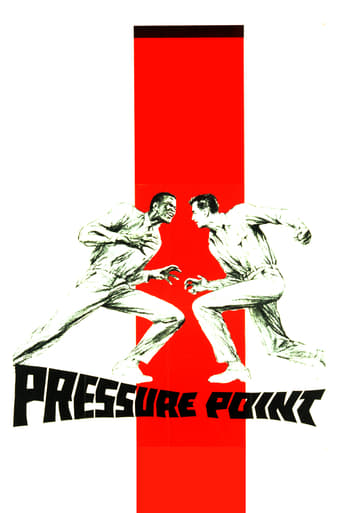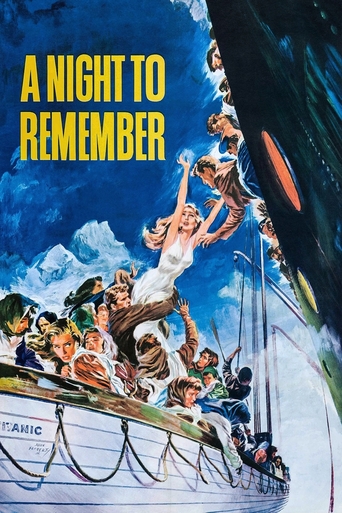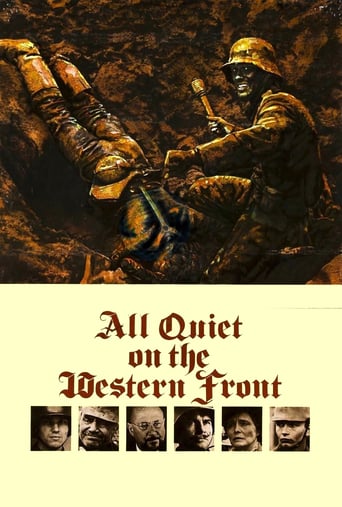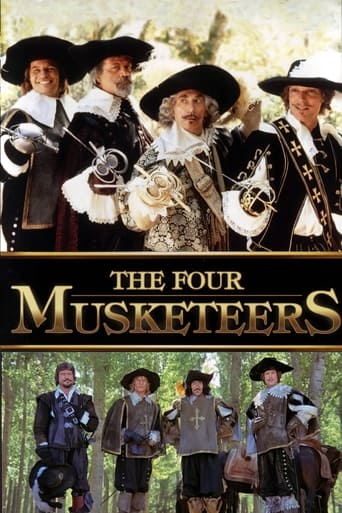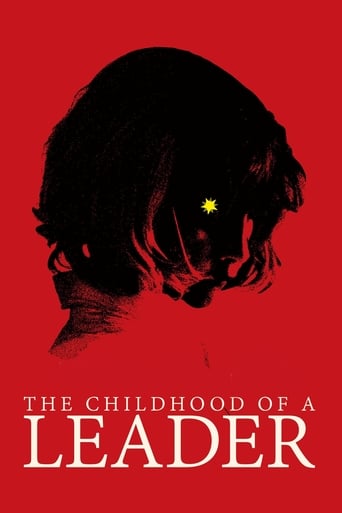
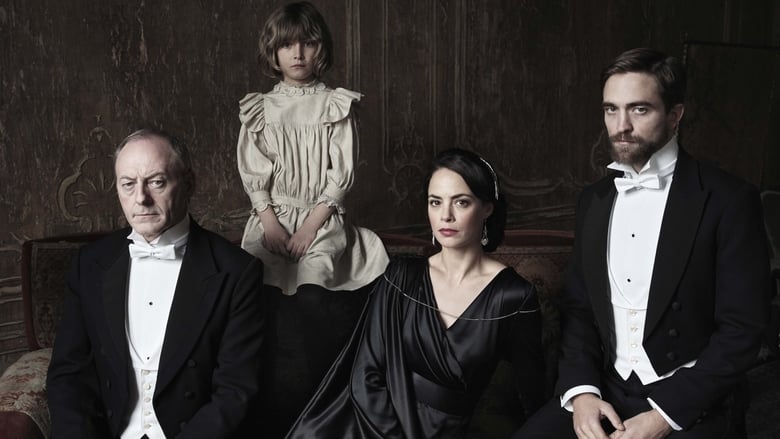
The Childhood of a Leader (2016)
The chilling story of a young American boy living in France in 1918 whose father is working for the US government on the creation of the Treaty of Versailles. What he witnesses helps to mold his beliefs – and we witness the birth of a terrifying ego.
Watch Trailer
Cast


Similar titles
Reviews
A chronicle of the childhood of a post-World War I leader. The fact that i even wasted 1 hour and 56 minutes of my life in this film makes me a pretty dumb person to be honest. I do like some of the actors that star in this film like Liam Cunningham, Robert Pattinson and even Stacy Martin. But the movie doesn't give to anyone any actual chance to prove their actual talent i mean common? What was even the purpose to have Robert Pattinson in this movie? He doesn't do anything he is useless and the fact that he plays even a 2nd role the role of the Leader makes no sense at all and what makes it even worse it's how fake the beard and his bold head look like. The parents of Prescott both pretty much suck at Parenting especially his Father he doesn't even try to come closer with his son and the same goes for his Mother even the characters that i thought were at least decent like Mona and the Teacher even those turned out to be pretty screwed up and the entire film makes no freaking sense it doesn't have a script, a story and it definitely doesn't have a good director, the movie has all those boring long shots of people walking up and down stairs with some pretty good music (the only good thing about the movie) playing in the background in scenes that aren't even supposed to be epic. The first 59 to 60 minutes were kinda and i say kinda half decent but once the film started going for one hour it started going downhill with some pretty dumb hilarious dialogue like the mother saying "i'm bleeding" when clearly she isn't as her husband touches her and his response is like "i'm not in mood anymore bye" seriously stuff like that actually happen in the movie. And Prescott's behavior doesn't even make that much of a sense on it's own he is just running around and he either stays in his room without eating or just falls down a couple of times. Plus the final shot of the film is the most dizzy and stupid scene i have seen in a movie in years it makes Paul Greengrass shaky cam look like a Masterpiece. Overall this movie did start kinda promising and like i said the soundtrack was pretty good and even haunting at times but it's used in moments that shouldn't even have music like that i would advice you to never seen this movie. (1/10)
Those indie filmmakers contemplating a directorial debut should beware of a dreaded contagion which I have dubbed "The Citizen Kane syndrome." You don't exactly have to be a boy wonder such as Orson Welles to churn out a well-received debut feature—all you have to do is be a technical virtuoso with a brilliant set design, highly original cinematography and an experimental, gripping score that diverts your audiences' attention from a screenplay that is so generic that virtually all psychological complexity is lost. Of course Welles managed to avoid all that until he substituted the stock melodramatic figure of his protagonist Charles Foster Kane for the real-life William Randolph Hearst, in the second half of what has come to be regarded as the most technically innovative film of the 20th century.Debut Director Brad Corbett also seems to have fallen victim to the "syndrome" in his rather specious take on the childhood of a wholly generic "Fascist leader." But before we examine the generic quality of his narrative, Corbett's talents still must be acknowledged. He has put together a story involving a period in history that is rarely covered these days—a behind-the-scenes look at the Versailles Treaty negotiations from the Allied point of view; what's more he's impressively employed Kane-like cinematography and music, creating a Gothic noir palette reminiscent of the German Expressionists.That being said, Corbett's story that seeks to explore the roots of fascism, manages to hold few surprises. His anti-hero (played by the young Tom Sweet) is named Prescott (aka "The boy")--he's the son of a married couple, a German woman and a US diplomat, who has arrived in France as part of the team to negotiate the terms of the Versailles Treaty with Germany, along with the other defeated countries in World War I.Corbett's narrative chronicles a series of tantrums the boy throws beginning with some rocks he hurls at parishioners leaving a church. The head priest tries to reason with the boy but his anti-social behavior continues. The mother's main crime, according to the film's scenarists, is that she overly-feminizes her son by failing to cut his hair short; at a certain point, the father's fellow diplomat mistakes the boy for a girl. On another occasion, the boy gropes the breasts of his French teacher--which I suppose is intended to suggest that he's acting out his Oedipal attachment on a more attractive substitute.Eventually the boy parades naked in front of the father's assembled associates and then locks himself in his room and won't come out, despite entreaties from his mother and a sympathetic maid who is eventually fired by the mother for encouraging him in his rebellious proclivities.Corbett takes a stab at blaming an authoritarian patriarchal culture for the boy's eventual descent into what appears more like Stalinism than Fascism at film's end—it's the boy's father who gives him a nice little whipping after refusing to comply with his demands to come out of his room. Thus, the boy's childhood traumas at the hands of his parents, serve mainly as the director's explanation for his embrace of evil as an adult.At the denouement, Corbett only offers a glimpse of his authoritarian martinet. And as argued before, it's a wholly generic portrait since we learn nothing about the future monster to be except that he's propped up by an adoring crowd of sycophants.Corbett also indulges in generalizing about the average man's apathy in the face of evil. Echoing Satayana's famous quote ("Those who cannot remember the past are condemned to repeat it"), he has one of his characters, Charles, a widowed British diplomat, quote the Sartre- influenced novelist John Fowles: "That is the tragedy: Not that one man has the courage to be evil, but that so many have not the courage to be good."Corbett's greatest failure here is to develop some of the ideas from his source material—a short story by Sartre (from which he takes the title of this film)—in it, Sartre follows his protagonist who has a one-time affair with a pederast poet and then joins a group of youths, who assassinate a Jewish man on the street. This idea is also found in Rossellini's film—Germany Year Zero—where a prepubescent boy murders his father after coming under the influence of a Nazi-sympathizer, a pederast, in post-war Berlin.Encounters that prepubescent boys and young teenagers had with pederasts and certain kinds of homosexuals (not of the liberal persuasion)--as chronicled in such books as "The Hidden Hitler" and "The Pink Swastika"—suggest that there may be more of a direct connection to adults joining fascist movements later on than what Corbett lets on here. Again, his rather tame speculation finds its roots in his simplistic, generic understanding of "evil"—not based on true, real-life experience. Still, Corbett is not without talent on a technical level—a script with more psychological depth the next time around should afford him an opportunity to join the ranks of talented directors churning out compelling art-house offerings.
Brady Corbet has assimilated many wonderful visual styles which he has picked up over the past several years working with master directors such as Von Trier and Haneke, but this is all Corbet has accomplished. Reappropriating stunning visual film language does not a good director make, because used haphazardly the images lose their ominous, dark tone and are instead replaced with empty somewhat pretentious images that have nothing story or acting wise holding it up. So all we are left is a misfire. While Corbet is similar to another young director, Xavier Dolan, in that they are trapped exercising their personal influences, Dolan has more innate talent. I would say that Corbet's command of the camera at times is promising. The sad part is he has a great skeleton but no meat and few functioning organs. The performances are a bit flat, though they are only working with what they are giving. Bejo is tiresome and Pattinson is...Pattinson. The best scene is in the beginning where the young boy gets in trouble with snowballs, a possible reference to Abel Gance's Napoleon. Corbet like Napoleon is undone by his ambition. But I do wish more directors were this ambitious in their debuts. If nothing else Corbet swung for the fences...and he should know better: nobody does Haneke better than Haneke.
Pretentious tosh. The most disappointing film I have seen recently, having read the glowing reviews. How can I expand this succinct review to 10 lines? The music is bombastic, the length of the shots self-indulgent on the part of the editor/director, the psychology superficial: "abused child grows up to be a bastard". I have not read Sartre's original, but I doubt whether it was as vapid as this. Some of the supporting actors were good, but Liam Cunningham, in particular, looked very uncomfortable in his sketchy role. The Robert Pattinson character was particularly mystifying: who was he? What was he doing there? Why was the actor used to play the adult Prescott?





